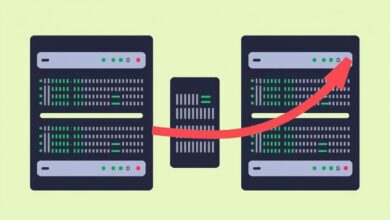AWS vs GCP vs Azure: A Simple Guide to Choosing the Right Cloud Provider

Choosing a cloud provider is a critical decision for businesses of all sizes. With Amazon Web Services (AWS), Google Cloud Platform (GCP), and Microsoft Azure dominating the market, understanding their core differences is key. This guide offers a simple comparison of AWS vs GCP vs Azure to help you navigate the options and make an informed choice.
The cloud computing landscape offers incredible power and flexibility, providing on-demand access to computing resources like virtual machines, storage, databases, and advanced services like AI/ML. While AWS, GCP, and Azure all provide these fundamental Infrastructure-as-a-Service (IaaS) and Platform-as-a-Service (PaaS) offerings, they differ in their market position, strengths, pricing models, and specific service portfolios.
Understanding the Big Three: AWS, GCP, and Azure
Let’s break down each provider individually before diving into a direct comparison.
Amazon Web Services (AWS): The Market Leader
AWS is widely regarded as the pioneer and current market leader in cloud computing. Launched in 2006, it has the most extensive global infrastructure and the broadest, deepest portfolio of services.
- Strengths: Maturity, reliability, vast service selection (over 200 fully featured services), extensive documentation and community support, large marketplace of third-party solutions.
- Use Cases: Suitable for almost any workload, from simple websites to complex enterprise applications, big data analytics, and IoT. Its dominance makes it a common choice for startups and large enterprises alike.
- Considerations: The sheer number of services can be overwhelming, and the cost structure, while flexible, can become complex to manage without careful monitoring.
Microsoft Azure: The Enterprise Favourite
Leveraging Microsoft’s long-standing relationships with enterprise customers, Azure has rapidly grown to become the second-largest cloud provider. Its key strength lies in its seamless integration with other Microsoft products and services (like Windows Server, Office 365, Active Directory).
- Strengths: Strong hybrid cloud capabilities, excellent integration with Microsoft ecosystem, comprehensive enterprise solutions, extensive global region coverage.
- Use Cases: Ideal for organizations already heavily invested in Microsoft technologies, large enterprises undergoing digital transformation, hybrid cloud deployments, .NET applications, and Windows workloads.
- Considerations: While catching up rapidly, its service breadth might still lag slightly behind AWS in some niche areas. The interface can sometimes feel less intuitive than competitors for certain tasks.
Google Cloud Platform (GCP): The Innovation Powerhouse
GCP is known for its strengths in data analytics, machine learning (ML), artificial intelligence (AI), and container orchestration (Kubernetes, which originated at Google). It often appeals to tech-savvy companies and those prioritizing cutting-edge technology.
- Strengths: Leadership in data analytics, AI/ML, and Kubernetes; often perceived as having competitive and user-friendly pricing (e.g., per-second billing for many services); strong open-source contributions.
- Use Cases: Data-intensive applications, machine learning projects, containerized applications, cloud-native businesses, organizations looking for potential cost efficiencies on compute instances.
- Considerations: While growing fast, its market share is smaller than AWS and Azure, potentially meaning a smaller community for support in some areas and fewer third-party integrations compared to AWS.
Key Comparison Points: AWS vs GCP vs Azure
Now, let’s compare them head-to-head on crucial factors:
Market Share and Presence
AWS consistently holds the largest market share, often cited as being larger than its next few competitors combined. Azure holds a strong second place, showing rapid growth, particularly in the enterprise sector. GCP is a solid third, carving out a significant niche, especially in data and AI. Recent reports from sources like Synergy Research Group consistently confirm this hierarchy.
Services Offered
All three offer core services like:
- Compute: Virtual Machines (AWS EC2, Azure VMs, GCP Compute Engine)
- Storage: Object Storage (AWS S3, Azure Blob Storage, GCP Cloud Storage)
- Databases: Relational and NoSQL options (e.g., AWS RDS, Azure SQL Database, GCP Cloud SQL)
- Networking: Virtual Private Clouds (VPCs) and related services.
Where they differentiate is often in specialized services, the maturity of those services, and ease of integration. AWS has the widest range, Azure excels in hybrid and Windows integration, and GCP leads in data analytics, AI/ML, and Kubernetes.
[Hint: Insert a comparison table graphic mapping key services across AWS, Azure, and GCP here]Pricing Models
Pricing is complex and highly dependent on usage patterns, chosen services, and commitment levels (reserved instances, savings plans).
- Billing Granularity: GCP pioneered per-second billing for many services, potentially offering cost savings over AWS and Azure’s per-minute billing (though AWS and Azure have adopted per-second for some services too).
- Discounts: All offer discounts for long-term commitments (Reserved Instances/Savings Plans) and Spot Instances (using spare capacity at lower prices). GCP’s Sustained Use Discounts automatically apply for long-running workloads without upfront commitment.
- Free Tiers: All providers offer generous free tiers for new users to experiment with services.
Direct cost comparison requires detailed analysis based on specific needs, but GCP is often highlighted for potential cost-effectiveness, especially for basic compute instances and workloads benefiting from per-second billing.
Making Your Choice: AWS vs GCP vs Azure
So, how do you choose?
- Assess Your Needs: What are your primary workloads? Are you heavily invested in Microsoft? Do you need cutting-edge AI/ML capabilities? Do you prioritize the broadest possible service selection or potential cost savings?
- Consider Your Expertise: Does your team have existing skills with a particular provider?
- Factor in Integration: How well does the provider integrate with your existing on-premises or other cloud tools?
- Compare Pricing (Carefully): Use the providers’ pricing calculators for your specific workload scenarios. Don’t just compare list prices.
- Evaluate Support and Community: Consider the availability of documentation, tutorials, and community support.
For more in-depth technical comparisons, you might look at specific service benchmarks or explore related topics like comparing cloud storage options.
Conclusion
There’s no single “best” cloud provider; the best choice depends entirely on your specific requirements, existing infrastructure, team expertise, and strategic goals. AWS offers unparalleled breadth and maturity. Azure provides seamless integration for Microsoft-centric organizations and strong hybrid capabilities. GCP shines in data analytics, AI/ML, containerization, and potentially offers competitive pricing. By understanding these core differences in the AWS vs GCP vs Azure comparison, you can confidently select the platform that best aligns with your needs.




